- 미국식 영어와 영국식 영어는 발음에서 큰 차이가 난다. 때로 철자도 다르고, 어법이나 어휘도 다른 경우가 있다. 의사소통에 문제가 생길 정도는 아니지만, 적절한 자리에서 적절한 어법을 사용할 필요가 있다. coach(미국식)와 manager(영국식), jersey와 shirt, soccer와 football처럼 다른 어휘뿐 아니라 단수와 복수 개념이 달리 쓰이기도 한다.
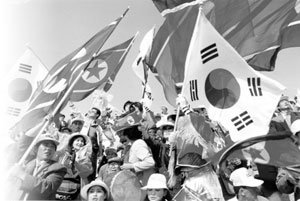
[비영어권 국가의 사람들은 영어권의 서로 다른 나라 사람들이 의사소통을 하는 게 쉽지 않을 거라고 오해합니다. 아랍권의 경우가 대표적입니다. 시리아 방언을 쓰는 사람은 고대 아랍어(코란 경전에 쓰인 언어인 까닭에 보편적으로 알려져 있음)로 변환하지 않는 한 구어체 아랍어를 쓰는 이집트 말을 이해하기가 매우 어려울 것입니다. 영어에는 고대 아랍어와 같은 기준어가 없지만, 미국식 영어를 쓰는 사람은 영국, 호주, 남아프리카공화국식 영어를 쓰는 사람에게 “이해가 안 돼요”라고 말하기만 하면, 알아들을 만한 설명을 들을 수 있습니다. 그럼에도 차이는 있습니다. 북한 축구에 관한 아래의 기사에서는 미국식 영어가 사용되었습니다. 그렇다면 영국식 영어는 어떻게 사용됐을까요?]
▶▶▶2 Koreas to Play in Same World Cup for the 1st Time
North Korea and Saudi Arabia played their final qualifiera for next year?s World Cupb at King Fahd International Stadium in Riyadh on June 17. The game remained scoreless after 90 minutes of regulation and five minutes of injury time.
The draw gave the North its first ticket to soccer?s grand event since 1966, and its jubilant players embraced each other to share their joy. Striker Jong Tae Se, who plays for the Japanese pro team Kawasaki, burst into tears after taking off his jersey. Coach Kim Jong Hoon also burst into tears.
North Korea and Saudi Arabia each had three wins, three draws and two losses for 12 points in Asia?s Group Bc, but goal difference secured second place in the group for the North and a berth in South Africa next year.
North Korea will play in its second World Cup after shocking the world with a quarterfinal advance in the 1966 tournament in England. Hence, both Koreas will play in the same World Cup finals for the first time.
● Asian tiger in the 1960s
North Korea has had a bumpy ride in the World Cup over the past 44 years. The Stalinist country had the best team in Asia in the 1950s and 60s. At that time, South Korea even boycotted a World Cup qualifier due to the heavy burden of playing its northern foe. In the 1966 World Cup, Pak Do Ik?s goal gave the North a shocking 1-0 upset of Italy and a berth in the quarterfinals.
That, however, would mark the end of the North?s soccer heyday. The country struggled throughout the 1970s and 80s due to its policy of isolation and economic hardship, snubbing qualifiers for the 1970 and 1978 tournaments. The North even failed to pass the first round of qualifiers for the 1974 and 1986 events. It was stopped in the final round of qualifiers for the 1982 Spain World Cup. North Korea advanced to the final qualifying round for the 1990 and 1994 tournaments, but finished bottom. It also missed the 1998 and 2002 editions. The country tried for the 2006 World Cup in Germany for the first time in 12 years, but finished with just one win and five losses in the final qualifying round.
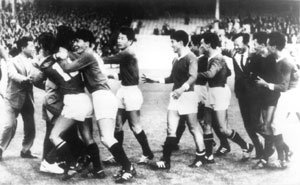
1966년 영국월드컵에서 이탈리아를 1-0으로 완파하고 환호하는 북한 선수들.
Foreign media have shown keen interest in North Korea?s advance to next year?s World Cup given the tension surrounding the country?s nuclear and missile development. The Associated Press, AFPd, the BBC, the Daily Telegraph, CNN and other outlets reported on the North?s qualification en masse.
The Daily Telegraphe recalled memories of the 1966 World Cupf, saying “North Korea is preparing a diplomatic storm by advancing into the World Cup finals” before the North had secured its ticket. The U.S. media also reported on North Korea?s qualification. The Washington Post said, “Just as the United States and Iran played in the same group during the 1998 World Cup in Franceg, the U.S. and North Korea could play in the same group”.
Soccer?s world governing body FIFAh also covered the North Korea-Saudi Arabia qualifier in detail on its website. FIFA?s homepage carried a photo of North Korean players waving their national flag and a video clip of the North?s 1966 World Cup team in England.
원문: http://english.donga.com/srv/service.php3?bicode=070000&biid=2009061978978
▶▶▶Exercise: Lexical and Structural Comparison(연습: 어휘와 구문 비교)
The words highlighted in the text above are those which predominantly define the writing as being in an American style:
| I. regulation | V. jersey | VIII. with a | X. of |
| II. its | VI. coach | quarterfinal | XI. it |
| III. soccer | VII. losses | advance | XII. editions |
| IV. pro | IX. has |
[위의 기사에서 짙은 글자로 강조된 다음의 단어들(I~XII)은 미국식 영어 스타일로 쓰인 글임을 확실히 보여주는 단어들입니다.]
Of course, these words also exist in British English, but the conventions of use vary. Nevertheless, it is the existence of all such words in a common lexicon which makes the language mutually intelligible, even where usage is markedly different. A British reader-like me-has absolutely no problem in understanding any of the text, although the American way of describing our national sport is often the subject of humour in Britain. See if you can match the British expressions below with the American lexis, in order to replace the words in the text.
| a) have | f) normal | k) by progressing to the |
| b) football | g) their | k)quarterfinals |
| c) they | h) defeats | l) tournaments |
| d) manager | i) shirt | |
| e) over | j) professional |
[물론 이 단어들은 영국식 영어에도 존재하지만 사용하는 방식이 다릅니다. 그러나 사용법이 명확히 다른 경우에도 영어권 각국이 서로 이해할 수 있는 것은 바로 공통된 어휘부가 존재하기 때문입니다. 비록 영국의 스포츠를 묘사하는 미국영어가 영국에서는 종종 농담거리가 되기도 하지만 저와 같이 영국식 영어를 쓰는 독자가 위 글을 이해하는 데는 전혀 문제가 없습니다. 글에 쓰인 미국식 영어 표현들(I~XII)을 아래의 영국식 영어 표현들(a~i)로 대체할 수 있도록 짝지어보시기 바랍니다.]
▶▶▶Answers and Explanations(정답과 설명)
| I. regulation | → f) normal |
| II. its | → g) their |
| III. soccer | → b) football |
| IV. pro | → j) professional |
| V. jersey | → i) shirt |
| VI. coach | → d) manager |
| VII. losses | → h) defeats |
| VIII. with a quarterfinal advance | → k) by progressing to the quarterfinals |
| IX. has | → a) have |
| X. of | → e) over |
| XI. it | → c) they |
| XII. editions | → l) tournaments |
▶▶▶Use of vocabulary(단어의 사용)
Many of the lexical differences illustrated here are habitual-in other words there is little difference in meaning between loss and defeat, jersey and shirt, editions and tournaments, except in the way they have become regularised through common use. Another example of this is the North American habit of using the abbreviation pro for professional, as in the sense of ‘pro ball’ to describe professional baseball: in England and Wales alone there are almost 100 professional football clubs (more in Scotland), so any media reference to the game implies professionalism. If British writers do use the word professional, they do not often abbreviate it.
[위에 기술된 상당수 어휘의 차이는 습관적인 것입니다. 다시 말해 loss와 defeat, jersey와 shirt, editions와 tournaments 사이에는 관습적으로 의미가 특정한 방식으로 규정된 경우를 제외하고 의미의 차이는 거의 없습니다. 습관적인 어휘 사용의 또 다른 예로는 professional baseball을 pro ball로 사용하는 것과 같이 professional 대신에 축약형인 pro를 사용하는 북미식 습관을 들 수 있습니다. 잉글랜드와 웨일스만 해도 거의 100개의 professional football club이 있어서 (스코틀랜드에는 더 많습니다) 어떤 대중매체에서든 축구 경기를 언급할 때는 프로 축구라는 의미가 함축되어 있습니다. 만약 영국식 영어를 쓰는 작가들이 professional이라는 단어를 쓴다면 대부분의 경우 pro라고 줄여서 쓰지 않을 것입니다.]
However, there are a couple of vocabulary issues worthy of further examination:
[좀 더 살펴볼 만한 단어 관련 문제가 몇 가지 있습니다:]
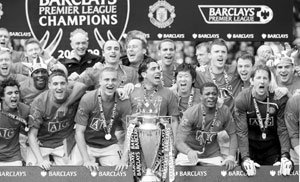
영국에선 professional이라는 표현을 쓰지만 미국에선 축약형인 pro란 말을 많이 쓴다. 사진은 2009년 5월 잉글랜드 프리미어리그에서 우승한 professional football club ‘맨유’.
[Soccer와 Football: football이라는 단어는 분명한 어원이 있지만 (foot과 ball-발은 거의 사용하지 않는 미식 축구와 다릅니다), soccer는 association이라는 단어가 와전된 것으로 일반적으로 받아들여지고 있습니다. 19세기 중반 영국에서 축구가 처음 확립되었을 때, 두 가지 종류가 생겨났습니다: 하나는 Rugby Football (공을 드는 것을 허용하는 경기로 이후 Rugby Union과 Rugby League로 나뉩니다)이고 다른 하나는 1863년 Football Association의 설립에서 이름을 딴 Association Football이었습니다. 한 이야기에 따르면 영국 선원들이 Association Football을 남미에 가져갔을 때 라틴계 언어 사용자들이 association을 제대로 발음하지 못해 soccer라는 근접한 발음으로 대신 쓰게 되었다고 합니다. 다른 이론들도 있지만 명확히 검증할 수 있는 이론은 없습니다. soccer라는 단어는 영국에서 때로 사용되기는 하지만 (Sky Sports 채널에 ‘Soccer Saturday’라는 텔레비전 프로그램이 있기도 합니다), football이라는 단어가 훨씬 일반적으로 사용되며 모든 클럽의 이름에 들어가 있습니다. FC는 Football Club을 나타냅니다.]
Coach to Manager: Britain is different from most of Europe as well as America in its use of the word manager to indicate the head coach of a football club. There are debates about the different areas of responsibility given to such a person (last season, for instance, Liverpool FC?s manager Rafael Benitez included increased control over transfer dealings in his negotiation of a new contract), but basically the manager of a British club chooses the team; is in charge of coaching (most actually do coach-i.e. lead the training of players-but a few don?t always involve themselves adequately, and Newcastle United FC once allegedly sacked manager Ruud Gullit for not taking training often enough); selects the players they?d like to transfer in or out; and so on. Outside Britain, the coach is often the person in charge of the match day team, leading training, etc., but has fewer responsibilities for transfer dealings, contract negotiations, and so on.
[Coach와 Manager: 축구 클럽의 지휘자인 coach를 나타내기 위해 단어 manager를 사용하는 것에 대해 영국은 미국뿐만 아니라 대부분의 유럽과도 다릅니다. 직책의 서로 다른 책임 영역에 대한 논쟁이 있지만 (지난 시즌을 예로 들면, 리버풀 FC의 manager인 라파엘 베니테즈는 새로운 계약의 협상에서 선수 이전과 관련하여 더욱 통제권을 가졌습니다), 기본적으로 영국 축구 클럽의 manager는 팀을 선택하고 코치하는 일과 전입 및 전출할 선수의 결정 등의 일을 맡게 됩니다. (대부분의 감독이 코치 일-즉, 선수들을 훈련시키는 일-을 하지만, 몇몇 감독은 그렇지 않습니다. 뉴캐슬 유나이티드 FC는 선수들을 충분히 훈련시키지 않았다는 이유로 루드 굴리트 감독을 사임시켰다는 이야기도 있습니다) 영국을 제외한 다른 나라에서는 coach가 경기와 훈련 등을 담당하는 사람으로, 코치는 선수 이전, 계약 협상 등과 관련해서는 영국의 manager 보다 책임이 작습니다.]
▶▶▶Structural differences(구문적 차이)
The main difference you may have noticed here is between the treatments of teams as singular or plural nouns. Most football club names come from towns, cities, or-in this case-countries. If you say ‘Liverpool is a great city’ or ‘Ireland is an independent country’, then clearly the entities are treated, grammatically, as singular nouns. This rule is applied consistently in American English where sports teams are concerned; hence North Korea has had a bumpy ride in the World Cup, and so on. However, in British English the convention is to refer to sports teams as a collective group of individuals, and so to use a plural verb form: North Korea have had a bumpy ride in the World Cup. Practically, this helps in distinguishing between the country and the team (British people would still say ‘The country struggled throughout the 1970s and 80s due to its policy of isolation and economic hardship’ because it clearly refers to the state), and the use of pluralised verb forms with apparently singular nouns is called ‘notional agreement’. Other ‘collective nouns’ which can take either a singular or plural verb, depending on the context, include government (‘the government are failing in their responsibilities’), class (‘my class are having difficulty understanding Present Perfect’), band names like Oasis (‘Oasis are cool’), and staff (‘our staff are asking for a pay increase’). Needless to say, where you have a collective noun in British English, pronouns referencing them become they rather than it, the possessive adjective their rather than its, and so on.
[위 기사에서 주된 구문 차이는 여러분이 이미 알아차릴 수 있듯이 축구팀 이름을 단수명사로 쓸지 복수명사로 쓸지에 관한 것입니다. 대부분의 축구팀 이름은 마을이나 도시 혹은 국가 이름에서 나옵니다. 만약 여러분이 ‘리버풀은 멋진 도시야’ 혹은 ‘아일랜드는 독립국가야’라고 말한다면, 여기서 리버풀과 아일랜드와 같은 개체들은 도시 혹은 국가명으로 분명하게 문법상 단수명사로 취급됩니다. 이 규칙은 스포츠 팀과 관련된 경우 미국식 영어에서 일관적으로 적용되고 있습니다. 따라서 미국식 영어에서는 North Korea has had a bumpy ride in the World Cup 등과 같이 씁니다. 하지만 영국식 영어에서는 스포츠 팀을 선수 개인이 모인 그룹으로 인식하기 때문에 다음과 같이 복수동사를 씁니다: North Korea have had a bumpy ride in the World Cup. 이와 같은 영국식 영어 규칙은 실질적으로 국가명과 팀명을 구분하는 데 도움이 됩니다. (영국 사람들은 분명히 국가를 단수명사로 나타내기 때문에 ‘The country struggled throughout the 1970s and 80s due to its policy of isolation and economic hardship’이라고 말할 것입니다) 명백히 단수인 명사와 함께 복수동사를 사용하는 것은 ‘개념적 동의’라고 합니다. 문맥에 따라 단수 혹은 복수동사를 취할 수 있는 다른 ‘집합명사’에는 government (‘the government are failing in their responsibilities’), class (‘my class are having difficulty understanding Present Perfect’), Oasis와 같은 밴드 이름 (‘Oasis are cool’), staff (‘our staff are asking for a pay increase’)가 있습니다. 영국 영어에서 집합명사를 쓸 때, 그 명사를 나타내는 대명사는 it이 아닌 they가 되고, 소유격으로는 its가 아닌 their가 되는 것은 당연합니다.]
▶▶▶Notes and Explanations(각주와 해설)
a Asian qualification for the FIFA World Cup involved three preliminary rounds, which lead to two final groups of four, with the best two teams in each group qualifying automatically (Australia and Japan from Group 1 and South Korea and North Korea from Group 2), and the two third-placed teams going into a home and away play-off for the right to play Oceania Champions New Zealand for the final place at South Africa 2010. This means that Saudi Arabia still have a chance of qualifying, despite finishing third: ironically they have to play off against island state Bahrain, their neighbours being linked to Saudi Arabia by a causeway.
[FIFA 월드컵의 아시아 지역 선발을 위해 세 번의 예선 라운드가 있었고, 이를 통해 네 팀으로 이루어진 두 개의 최종 그룹이 남게 되었습니다. 각 그룹의 상위 두 팀이 자동적으로 진출하고 (그룹 1에서 호주와 일본, 그룹 2에서 남한과 북한), 각 그룹의 세 번째 순위 팀들이 홈 경기와 어웨이 경기를 치르고 오세아니아 챔피언인 뉴질랜드와 격돌해 2010 남아프리카공화국 월드컵의 마지막 출전 자격을 가리게 됩니다. 이는 비록 3위에 그치기는 했지만 사우디 아라비아 국가대표팀에게 아직 출전의 기회가 있다는 것을 의미합니다. 공교롭게도 사우디 아라비아 국가대표팀은 도로로 연결된 이웃 섬 국가인 바레인을 상대로 경기를 하게 되었습니다.]
b ‘World Cup’ means the FIFA World Cup, which began with a tournament in Uruguay in 1930 involving only 13 teams - nine from the Americas and four from Europe. The tournament has been held every four years since, (not between 1938 and 1950, however). Brazil have been World Champions five times, with Italy (the current Champions) four times, Germany three times (twice as West Germany), Argentina and Uruguay twice, and England and France once. The 19th World Cup takes place in South Africa, from June 11 to July 11, 2010.
[‘월드컵’은 FIFA 월드컵을 말하는 것으로, 1930년 우루과이에서 오직 13개 팀(북남미에서 9개국, 유럽에서 4개국)만이 출전한 토너먼트로 시작했습니다. 이후 월드컵은 (1938년과 1950년을 제외하고) 4년마다 개최되었습니다. 브라질은 다섯 번, 이탈리아(현재 우승국)는 네 번, 독일은 세 번 (서독이었을 때 두 번), 아르헨티나와 우루과이가 두 번, 잉글랜드와 프랑스가 각각 한 번 우승을 했습니다. 열아홉 번째 월드컵은 2010년 6월11일부터 7월11일까지 남아프리카공화국에서 개최됩니다.]
c ‘Group B’ here was officially Group 2, and consisted of five teams: Republic of Korea, Korea DPR, Saudi Arabia, Iran, and the United Arab Emirates, finishing in that order in the final table.
[여기서 ’B조’는 공식적으로 그룹 2를 나타내며 다음과 같은 다섯 팀으로 구성되어 있습니다: 최종 예선 결과 순서대로 남한, 북한, 사우디아라비아, 이란, 아랍에미리트연합입니다.]
d AFP is Agence France-Presse, the oldest news agency in the world, and one of the three largest, along with the Associated Press and Reuters.
[AFP는 Agence France-Presse의 줄임말로 세계에서 가장 오래된 언론사이며 Associated Press와 Reuters와 더불어 세계 3대 대형 언론사 중 하나입니다.]
e The Daily Telegraph is a broadsheet British newspaper, headquartered in London, and established in 1855. It is only the ninth largest newspaper in the UK by circulation, but the best-selling ‘quality’ newspaper. It has a reputation for being conservative, but is also well-known for its excellent football coverage. See www.telegraph.co.uk for their website.
[The Daily Telegraph는 영국의 정론 신문으로 런던에 본부를 두고 있으며 1855년에 설립되었습니다. 발행 부수로 봤을 때 영국에서 아홉 번째이지만, ‘일류’ 신문 가운데는 가장 잘 팔리는 신문입니다. 보수적이라는 평을 받고 있지만 축구 기사로도 유명한 신문입니다. 웹사이트 주소는 www.telegraph.co.uk 입니다.]
f The 1966 World Cup in England was full of controversy and surprise. Not only were the English embarrassed by the theft of the Jules Rimet Trophy (the original World Cup statuette-eventually recovered from under a hedge by a dog named Pickles), but the tournament was marred by poor refereeing and player violence: Brazilian star Pele was so consistently fouled he was unable to continue playing, and the holders went out. Argentine Captain Rattin was red-carded in the quarterfinal against England but refused to leave the pitch, until a policeman escorted him off. England beat West Germany 4-2 in the final-but only after extra-time and the crucial third goal being awarded by a Soviet linesman despite bouncing on the goal-line. However, the North Korean team provided one of the best stories of the whole tournament: having lost their opening game 3-0 to the Soviet Union, and then drawn 1-1 with Chile, they beat Italy 1-0 -in fact the same scoreline by which the Italians had lost to the Soviets three days previously. This sent the Italians, then twice World Champions, home to a barrage of tomatoes from disgusted fans, and set up a quarterfinal meeting for North Korea, second in the group behind the Soviet Union, with Portugal, who had already knocked out Brazil. Korea DPR had struggled to score goals in their previous games, but amazingly went 0-3 up against Portugal, before legendary striker Eusebio scored four as the Europeans came back to win 5-3; Eusebio finished as the tournament?s top scorer, largely due to these goals.
[1966년 영국월드컵은 논쟁거리와 놀라움으로 가득했었습니다. 줄리메컵(월드컵 트로피)을 도둑 맞아 놀랐을 뿐만 아니라 (결국 피클즈라는 이름의 개가 울타리 아래에서 찾아내어 회수되었습니다) 공정하지 못한 심판 판정과 선수들 폭력에 의해 망가졌습니다. 브라질 축구 스타 펠레는 상대팀 선수들의 계속된 반칙으로 경기를 진행할 수 없었고 기존의 우승국들은 경기를 기권했습니다. 아르헨티나 국가대표팀의 주장 Rattin은 영국을 상대로 한 준준결승에서 레드 카드를 받았으나 경기장을 떠나기를 거부하여 경찰관에 이끌려 퇴장당했습니다. 영국은 결승에서 독일을 4대2로 꺾었는데, 이는 연장전에서 이긴 것으로 소련 선심이 골라인에서 튀는 공을 득점으로 인정하여 중요한 세 번째 골을 얻어냈습니다. 북한은 영국월드컵을 통틀어 최고의 이야깃거리 중 하나를 만들어내었습니다. 북한은 첫 경기에서 3대0으로 소련에 패하고, 1대1로 칠레와 비긴 후, 이탈리아를 1대0으로 꺾었습니다. 3일 전에 소련에 패한 이탈리아는 북한과 승점이 동일한 상태였습니다. 이로 인해 두 차례나 월드컵 우승을 했던 이탈리아 국가대표팀은 귀국하여 실망한 팬들로부터 토마토 세례를 받았으며, 북한은 소련 다음으로 조 2위가 되어 브라질을 격파한 포르투갈과 함께 8강에 올라갔습니다. 북한은 전 경기에서는 득점이 저조했으나 놀랍게도 포르투갈을 상대로 3대0으로 앞서 나갔습니다. 하지만 전설의 스트라이커 에우제비오가 4득점을 하여 3대5로 역전당했습니다. 에우제비오는 이 경기에서 얻은 득점으로 월드컵 최고 득점자가 됩니다.]
g The game between Iran and the US in France in 1998 was highly anticipated due to the longstanding enmity between the two nations and obvious religious differences. In a match played in good spirits, Iran took the lead through Estili in the first half, before a frantic last six minutes saw Mehdi Mahdavikia make it 2-0 and Brian McBride pull one back for the Americans. Each scorer celebrated by making their respective gesture of prayer to God.
[1998년 프랑스월드컵에서 이란과 미국의 경기는 두 국가 간의 오랜 대립과 종교적 차이로 인해 매우 관심을 끌었습니다. 공정하게 치러진 이 경기에서 이란은 전반 에스틸리의 선취 득점으로 경기를 이끌다가 마지막 열광적인 6분 동안 메흐디 마다비키아가 점수를 2대0으로 만들고 이후 미국의 브라이언 맥브라이드가 1점을 만회했습니다. 득점한 선수들은 그들 각자의 신에게 기도를 올리는 골 세리머니로 득점을 기뻐했습니다.]
h FIFA stands for Fe?de?ration Internationale de Football Association, which translates from the French as The International Federation of Association Football. The organisation was founded in 1904 with Frenchman Robert Gue ?rin as its first president. It now has 208 member associations-more members than the United Nations or The International Olympic Committee-and the current president is Swiss national Sepp Blatter. The headquarters of FIFA is in Zurich, and their official website is www.fifa.com-it?s packed with current news, history, organisational details, videos, and more, if you?re interested.
[FIFA는 Fe?de?ration Internationale de Football Association 이라는 불어의 줄임말로 국제축구연맹(영어로는 The International Federation of Association Football)이 됩니다. FIFA는 1904년 프랑스인 로베르 게렝이 초대 회장으로 창립되었습니다. 현재는 208개국이 회원으로 가입해 있는데 이는 유엔과 국제올림픽위원회보다도 많은 회원 수입니다. 그리고 현 회장은 스위스 출신의 제프 블라터입니다. FIFA의 본부는 취리히에 있으며, 공식 웹사이트는 www.fifa.com으로 최신 소식과 역사, 조직 세부사항, 동영상 등이 마련되어 있습니다.]
마틴 구시는 서울 광화문 영국문화원(www.britishcouncil.or.kr)에서 코스 창의력과 학생 지원 담당 매니저로 일하고 있다. 영국 런던 정경대에서 역사학 석사 학위를 받은 구시는 경력 15년의 베테랑 강사이며, 한국에서 3년째 살고 있다. 축구를 좋아해 리버풀과 길링엄, 잉글랜드 축구팀의 팬이며, 영국문화원의 ‘축구문화’ 웹사이트(현재는 영국문화원 사이월드 홈페이지(cyworld.com/britishcouncil) 편집을 담당했다.

















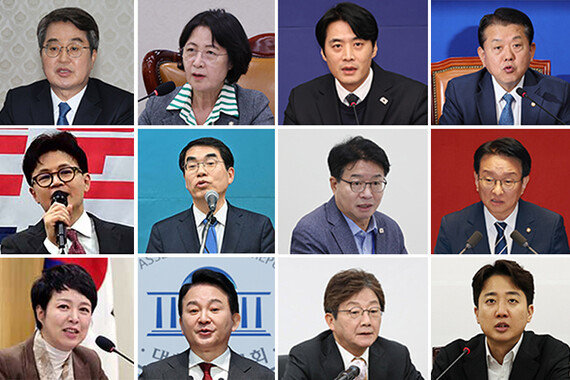
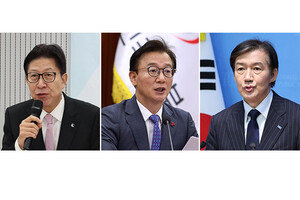

![[밀착취재] 리딩방 70여 명 대부분이 한통속…기망하는 수법까지 매뉴얼화](https://dimg.donga.com/a/380/211/95/1/ugc/CDB/SHINDONGA/Article/69/48/98/bd/694898bd2399a0a0a0a.jpg)

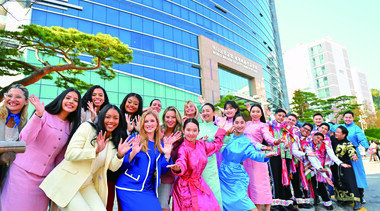
![[지상중계] 제12회 나지포럼, “북미 정상회담 성과내기 어려워”](https://dimg.donga.com/a/380/211/95/1/ugc/CDB/SHINDONGA/Article/69/43/48/32/69434832107aa0a0a0a.jpg)
